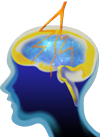Sleep disorder treatment in Borivali, Mumbai
What is Sleep Disorder?
A sleep disorder is a condition in which your ability to get adequate sleep will be lost. While occasional sleep issues are common, it is normal to have trouble falling asleep or feeling drowsy throughout the day on a daily basis.Common sleep disorders
Sleep is a difficult state of awareness because it may be disrupted in a variety of ways. The following are some of the most prevalent sleep complaints:
- Insomnia – refers to difficulty falling or staying asleep. It is the most prevalent adult sleep disorder.
- Jet lag — traveling to a different time zone disrupts the body’s internal clock, which takes many days to readjust. Working the night shift might cause symptoms similar to jet lag.
- Narcolepsy is characterized by excessive exhaustion with occasional drowsiness throughout the day, which might involve involuntary sleeping.
- Periodic limb movement disorder (PLMD) is characterized by leg muscular spasms that might cause the sleeper to wake. This is more frequent in middle-aged and older people.
- Restless legs — pain in the lower legs that improves with movement and worsens later in the day, causing the individual to move their legs or get up and walk about.
- Snoring is characterized by loud breathing generated by a constricted throat and nose. Males are more likely to suffer from it.
- Sleep apnea occurs when the upper airway becomes blocked, causing airflow and breathing to cease for a period of time while sleeping.
- Sleepwalking is more common in youngsters than in adults.
- REM sleep behavior disorder — the sleeper acts out what they see in their dreams, which might include hitting or kicking.
What are the Tests and Treatments for Sleep Disorders
- Polysomnography: A sleep study that assesses oxygen levels, bodily movements, and brain waves to determine how they interfere with sleep.
- Electroencephalogram (EEG): This is a test that evaluates electrical activity in the brain and identifies any possible abnormalities linked with this activity.
- Genetic blood testing: This is a blood test that is widely used to identify narcolepsy and other underlying health disorders that may be causing sleeping difficulties.
- Sleep Diary: Keeping a sleep diary might assist your doctor in making a diagnosis.
- Epworth Drowsiness Scale is a standardized questionnaire used to detect sleepiness throughout the day.
- Actigraphy is a test used to assess sleep-wake cycles. Actigraphy is a small gadget that monitors movement and is placed on the wrist.
Insomnia may be a sign of depression, anxiety, or another mental health condition; thus, your first examination may include a mental status check, mental health history, and basic psychological tests.
What is the treatment for sleep disorders?
Healthcare practitioners suggest a number of therapies, including:
- Counseling: Cognitive-behavioral therapy is recommended by certain sleep experts. This sort of therapy assists you in “recognising, challenging, and changing the stressful ideas” that keep you awake at night.
- Medications and nutritional supplements are provided by neurologist
- Maintaining a regular sleep pattern and regular physical activity is recommended for patients affected with sleep disorder.
For more information & consultation on Sleep disorder treatment in Borivali, Mumbai Call our expert Dr. Amit Shah – Consultant Neurologist in Mumbai on 9819561456 or Book an Appointment

